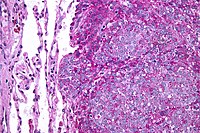
Photo from wikipedia
Abstract Soft tissue sarcomas (STSs) are heterogeneous at the clinical with a variable tendency of aggressive behavior. In this study, we constructed a specific DNA methylation-based classification to identify the… Click to show full abstract
Abstract Soft tissue sarcomas (STSs) are heterogeneous at the clinical with a variable tendency of aggressive behavior. In this study, we constructed a specific DNA methylation-based classification to identify the distinct prognosis-subtypes of STSs based on the DNA methylation spectrum from the TCGA database. Eventually, samples were clustered into 4 subgroups, and their survival curves were distinct from each other. Meanwhile, the samples in each subgroup reflected differentially in several clinical features. Gene Ontology (GO) and the Kyoto Encyclopedia of Genes and Genomes (KEGG) analysis was also conducted on the genes of the corresponding promoter regions of the above-described specific methylation sites, revealing that these genes were mainly concentrated in certain cancer-associated biological functions and pathways. In addition, we calculated the differences among clustered methylation sites and performed the specific methylation sites with LASSO algorithm. The selection operator algorithm was employed to derive a risk signature model, and a prognostic signature based on these methylation sites performed well for risk stratification in STSs patients. At last, a nomogram consisted of clinical features and risk score was developed for the survival prediction. This study declares that DNA methylation-based STSs subtype classification is highly relevant for future development of personalized therapy as it identifies the prediction value of patient prognosis.
Journal Title: Medicine
Year Published: 2021
Link to full text (if available)
Share on Social Media: Sign Up to like & get
recommendations!